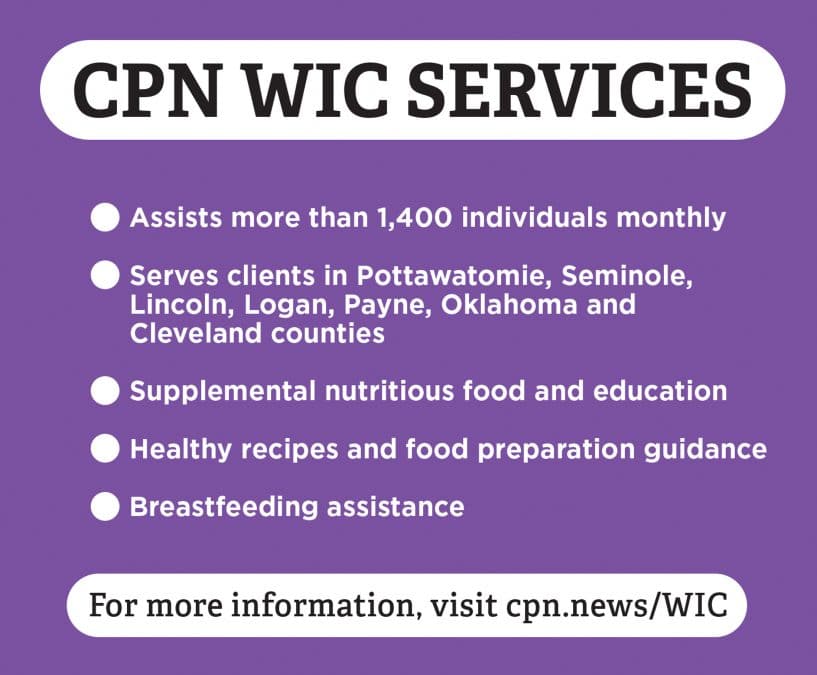When many businesses and industries came to a screeching halt throughout the coronavirus pandemic, Citizen Potawatomi Nation’s Women, Infant and Children’s programs found new and innovative ways to continue serving clients across seven counties in central Oklahoma. WIC assists more than 1,400 individuals each month, providing access to nutritious foods and education as well as referrals and breastfeeding consultation to low and moderate-income women and children.
CPN WIC’s Nutrition and Breastfeeding Coordinator Cheryl Richardson joined the Nation’s workforce in 1988. During a Zoom interview with the Hownikan, Richardson said flexibility is essential as a WIC employee.

“WIC has evolved and changed, and not just me, but all staff have had to evolve and change along with it,” she said.
WIC provides supplemental nutritious foods and education to mothers and children that meet specific qualification standards. Before the pandemic, staff met one-on-one with clients, but now, they administer assistance by phone.
Although WIC is limiting contact, all of its programs remain available. As the coronavirus continues spreading across Oklahoma, Richardson said eating nutritious foods is more important than ever for pregnant women, mothers and children.
“We offer fresh fruits and vegetables, whole grains and maybe some foods they might not normally think about picking up that are definitely healthier choices. We can help expose them to healthier options, and in doing that, hopefully set their children up for a healthier lifestyle,” she said.
CPN WIC also provides recipes and discusses preparing healthy meals with clients, setting them on the track to success.
“Nutrition education is a big part of what we do,” Richardson said.
Tailoring
Because the CPN WIC program serves clients in Pottawatomie, Seminole, Lincoln, Logan, Payne, Oklahoma and Cleveland counties, employees keep up-to-date on various external assistance to provide referrals based on the services available.
“Each clinic is a little bit different, but we give the same benefits as far as WIC. We have different resources in each area because we have our urban areas like Oklahoma City and Shawnee, and then we have our small towns and rural areas. We serve the whole gamut,” Richardson said.
Before the pandemic began, CPN WIC’s clinics in Oklahoma City and at the FireLake complex near Shawnee helped clients in-person five days a week. In the less populated areas across the seven counties served, staff used space provided by other tribes as well as WIC’s mobile unit.
“It’s basically a clinic inside of itself,” Richardson said. “We can do a certification, we can weigh and measure and conduct hemoglobin tests. Now, with COVID, we are waived from doing things that require face-to-face contact with participants because they’re considered a vulnerable population. … Everything we do is over the phone.”
Richardson stressed that although they are no longer meeting clients in person, staff remain dedicated to helping them thrive, whether that includes discussing breastfeeding issues through video chats or expanding partnerships with nonprofits to bridge gaps.
Cooperation
When WIC learned about the opportunity for Infant Crisis Center to hold drive-thru services in Pottawatomie County, CPN offered the space required.
“We have been lucky that Infant Crisis Center started branching out with their BabyMobile and started going different places, not just Oklahoma City. They have come to our parking lot in Shawnee,” Richardson said.
CPN’s location remains one of the BabyMobile’s busiest monthly sites. The program assists clients with formula, diapers and other necessities, which at times, have been hard to procure throughout the coronavirus pandemic.
“I don’t think people understand the needs and the stress involved with not being able to find what you need for not just your baby but yourself,” Richardson said.
Every monthly visit, the drive-thru provides essential resources for approximately 150 families with children up to 3 years old, and there are no income restrictions. A recent Avedis grant for $10,000 helped offer additional BabyMobile visits, and clients were able to receive help beyond the regular four-per-year maximum.
In addition to her work with CPN, Richardson serves on a COVID-19 workgroup with the National WIC Association.
“Anything dealing generally with COVID and definitely anything dealing with moms and breastfeeding, I am pulling and looking at,” she said.
A recent study published by The American Journal of Maternal/Child Nursing indicated that more than 80 percent of mothers reported experiencing shortages in necessary items for their babies. The expanded partnership with Infant Crisis Center helps mitigate this issue across Pottawatomie County.
Richardson said research indicates breastfeeding can introduce coronavirus antibodies to infants. This is further supported in a study published by Science Magazine, which said lactating mothers recovering from COVID-19 may be able to strengthen their baby’s immunity to the virus.
The Centers for Disease Control and Prevention updated information in December 2020 that indicated coronavirus infections in neonates is not common, and if infants to become infected, they are usually asymptomatic.
According to the CDC, “Breast milk provides protection against many illnesses and is the best source of nutrition for most babies.”
CPN WIC has many resources to help families breastfeed successfully. Richardson encourages those who may qualify for any of WIC’s assistance to reach out, and she stressed CPN’s WIC serves Native Americans and non-Natives alike.
“Right now, it’s easier than ever because the certification process is done over the phone, and you can participate as much or as little as you want,” she said. “If you’re wanting information, if you’re wanting help, if you’re wanting answers to questions, we’re here.”
Find more information on CPN WIC at cpn.news/WIC, and follow them on Facebook to receive notifications on monthly BabyMobile visits at facebook.com/CPNWICMain.
